Book contents
- Frontmatter
- Contents
- Illustrations
- Notes on contributors
- Acknowledgements
- Abbreviations
- Introduction
- Part I Contexts
- Chapter 1 ‘Mailed into space’
- Chapter 2 ‘The photographic chamber of the eye’
- Chapter 3 ‘O the tangles of that old bed’: fantasies of incest and the ‘Daddy’ narrative in Ariel
- Chapter 4 Plath and torture: cultural contexts for Plath’s imagery of the Holocaust
- Part II Poetics and composition
- Part III Representation
- Bibliography
- Index
Chapter 3 - ‘O the tangles of that old bed’: fantasies of incest and the ‘Daddy’ narrative in Ariel
from Part I - Contexts
Published online by Cambridge University Press: 07 September 2011
- Frontmatter
- Contents
- Illustrations
- Notes on contributors
- Acknowledgements
- Abbreviations
- Introduction
- Part I Contexts
- Chapter 1 ‘Mailed into space’
- Chapter 2 ‘The photographic chamber of the eye’
- Chapter 3 ‘O the tangles of that old bed’: fantasies of incest and the ‘Daddy’ narrative in Ariel
- Chapter 4 Plath and torture: cultural contexts for Plath’s imagery of the Holocaust
- Part II Poetics and composition
- Part III Representation
- Bibliography
- Index
Summary
fugue: Psychiatry . A flight from one’s own identity, often involving travel to some unconsciously desired locality. It is a dissociative reaction to shock or emotional stress in a neurotic, during which all awareness of personal identity is lost though the person’s outward behaviour may appear rational. On recovery, memory of events during the state is totally repressed but may become conscious under hypnosis or psychoanalysis. A fugue may also be part of an epileptic or hysterical seizure. Also attrib. as fugue state.
(OED)‘But if that is so, there was no childhood memory, but only a phantasy projected back into childhood. A feeling tells me, though, that the scene is genuine. How is that to be accounted for?’
There is in general no guarantee of the data produced by our memory.
( Imaginary patient and Freud, ‘Screen Memories’)Sylvia Plath’s ‘Little Fugue’ is one of twelve poems Ted Hughes added to Plath’s Ariel, after excising several poems deemed too ‘personally aggressive’. Like many of Hughes’s editorial decisions, this one enhances the ‘Daddy’ narrative in Ariel, strengthening the story of Otto Plath’s culpability in causing Plath’s suicide while diminishing the story that Hughes’s abandonment of Plath and his infidelity contributed to her depression and suicide. When Plath read ‘Daddy’ for BBC radio in 1962, she introduced the poem with an explicitly psychoanalytic tale about the speaker: ‘Here is a poem spoken by a girl with an Electra complex. Her father died while she thought he was God. Her case is complicated by the fact that her father was also a Nazi and her mother very possibly part Jewish.’ In popular notions of psychoanalysis (like this one Plath invents), just as a boy with an Oedipus complex longs for a sexual relationship with his mother, the daughter with an Electra complex is tormented by incestuous desire for her father. For the speaker of ‘Daddy’, this desire has been replaced by murderous rage, and, though she has in the past ‘tried to die’ to get back to him, she now redirects this self-destructive passion at her father: ‘Daddy, I have had to kill you’.
- Type
- Chapter
- Information
- Representing Sylvia Plath , pp. 54 - 66Publisher: Cambridge University PressPrint publication year: 2011



